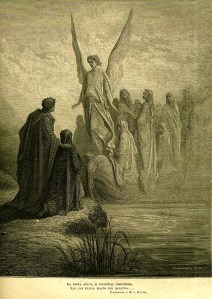People plan for births, for retirements, proms, dates, Thanksgiving dinners and Oscar parties. So, it’s only logical that one plans their own funeral. This is not a new idea. The whole point is to take the burden of the eschatological events off the shoulders of those that remain behind. It’s my feeling that those who do this sort of decision-making also want to make sure nothing is missed. You know how it goes:
“Gosh, I don’t think we have time for that hymn, let’s drop it. He’ll never know the difference, will he?”
There was a man I was told about, years ago, who decided that he was going to have the final word about his final words.
I was told the following story as I slipped a Susan B. Anthony dollar coin into the charity box at a church in Montreal and attempted to find a wood skewer to light a candle. This was something I did since my altar boy days at St. Eustace of Everlasting Guilt church in Ashtabula, Ohio, where I grew up. A very attractive woman produced a wood stick and held it out to me. I lit the end from the flame of another candle. The thought occurred to me as I did so, perhaps the existing candle flame was lit by some kind of strange person with an even stranger prayer to send to God. I then looked for a small dollar-size votive candle to light and send my own prayer. I looked and looked but could only find the $5.00 size votive. So, I lit one. I made a mental note that I owed the church $4.00.
The attractive woman was watching me as I struggled through the candle selection, noticing the worried look on my face. When I was finally finished, I said my prayer, the one that was to be taken heaven-ward by the candle, and wondered when I was going to have the chance to bring the $4.00 back to the charity box.
She smiled at me and with her eyes, led me to a nearby pew, inviting me to sit with her.
“I’d like you to hear my story,” she said. “It’s about my late husband, Avery, and his funeral.”
I thought this would be about as interesting as watching mollusks mate, but she had shown me a kindness in producing the wood, so I agreed to listen to what she had to say. Besides, she was a widow and we all know about widows. Next stop would be a bistro, a glass of wine and then the Hotel d’Ville. She needed to talk. I became the listener.
Her husband’s issues with death began when he was in college. He went to a small school in the south where thunderstorms were of an intensity he was not used to experiencing. It was during one of the crashing, flashing tempests outside his dormitory door that he felt the lump at the base of his skull, in the back of his head. He was alone because he had paid the extra fee to not have a roommate that semester. He liked his quiet. He liked to read. He liked to play solitaire. He didn’t want to have a dorm mate coming in at midnight on a Friday and bragging about his romantic conquests with the wrestling cheerleader as he had the semester before. Once his roommate had shown him the little pink flower that was sewn onto the front of his girlfriend’s bra. He never said how he got it. Avery just hoped it wasn’t part of a satanic cult initiation practice and that bits of the cheerleader would show up years later when the nearby soy bean field was being plowed up for condominiums.
Well, it seems that Avery felt this lump at the base of his skull several times a night. He became convinced that it was growing by the hour. The lump, the thunderstorm, his Catholic guilt over the things he merely thought about all came together for the poor guy one evening. He was certain he was the host of a malignant growth in his brain and that he had only about seven months to live. What better way to pass the last weeks than to sit on his bed and await the God of Revenge to come crashing through the door of room 117?
It became clear after about eight years that he had misdiagnosed himself. But no matter, something else was going to strike him down someday in the future. Poor Avery never quite realized until many years later that everyone was going to get something and then die from it.
“Well,” the woman said, “my Avery finally came down with something the doctors could not cure. He had a rare form of Cerebral Cortex Blastio Degenerative Syndrome. This meant that in a matter of months, his brain would be the consistency of a slug. Death would follow…but it would be a quiet, pain-free end. After all, there would be no neurological processes left to cause discomfort. His body would have the sensation of an inflatable Date-Me Doll.”
“I’m so sorry,” I said, with real sympathy. I thought about going back to the votive rack and lighting another $5.00 candle, owing the church an even $9.00.
She continued:
Avery, during his final lucid months, said that he was going to write out the overall plan for his funeral. At first this was a general outline with an attached “To Do” list. But as time passed, he became more and more involved in taking full charge of the services. He consulted with the Funeral Director, the Pastor, the Choir mistress and a few sound technicians. He wanted everything to sound good, given the acoustics of the church. He then hit the books, looking for appropriate readings. Avery did not want the usual 23rd Psalm. It was overused, he thought. He also wanted very much to have his life’s meager accomplishments mentioned. He couldn’t trust that his family and friends cared enough about him to tell of the really wonderful things he had done. He was, after all, a shy guy and didn’t often blow his own horn. Avery had been to enough memorial ceremonies to get a sense that some people, quiet people, did great things and that a few true friends found out about these rather small things. The last thing he wanted was to lie in the rosewood box and hear nothing of the funny, clever and humanitarian aspects of his life.
Then, there was the music. The music had to be perfect. The selections had to say something about him and put his life into some kind of context.
He thought about “Don’t Bring Me Down” by the Animals. Or, “We Got To Get Outta This Place” by the same group. He dismissed these as too intense for the mood he was looking for among the mourners.
He noted how popular “Amazing Grace” was at funerals, but to be done right, it would require a Bagpiper, and his budget was being stretched enough as it was. Beside, he wasn’t a policeman.
He finally settled on “Meditations from Thais” by Massenet. It clocked in at a little over seven minutes. Perfect. This was important, he knew, because he had made a careful study of people’s attention span. He hung out at concerts, lectures and Knights of Columbus ceremonies and watched how long a speech went before people started to fiddle with their cell phones. He found that seven minutes was probably the maximum.
Besides, “Meditations” always made him sad, and he wanted the funeral goers to be sad. Not sobbing and wailing Irish sad, but just enough to have them stop and think: “Hey, there was more to Avery than I thought”.
The funeral was to take place in his hometown. It was a short walk from the church to the hilltop cemetery. At one point in his planning, he thought that he would need six strong men and true to link arms and boldly carry the casket through the streets and up the hill to the gravesite. That presented a problem in itself. He couldn’t find six strong men and true that were still his friends. The only ones he knew had retired and moved to Myrtle Beach to boldly play golf.
It was also his idea to recreate a truly classical death march by having three barefoot virgins dressed in short white silk garments and wearing garlands of wildflowers around their heads to lead the procession and to toss out black rose petals from gold-plated trays. All this while a jester shook a tambourine and a black jazzman wearing a top hat would play “When The Saints Go Marching In” on his trombone. The jazz player would have been an easy hire because a trio was booked in at the local Ramada, but after an extensive search of the middle schools, three virgins could not be found.
As he was planning all this, the idea came to him to hire the Mormon Tabernacle Choir to sing “Oh, Happy Days”. He scratched this idea when he realized the church was too small and that the Mormon’s probably wouldn’t be playing an old Negro Spiritual.
“In the end,” the attractive woman said, “it all went quite well. I’m sure Avery would have been pleased about the comments made by his friends, both of them. Each one had the same memory of how he tripped someone in the cafeteria line when he was in high school. But, I think the worst mistake I made in my alterations to his well-made plans was to drop the “Meditations” and substitute a recording of the Captain and Tennille singing “Kumbaya”.
“It’s all for the best,” I said. “Interested in having a drink around the corner at Auberge?”
“Sure”, she said, “I thought you’d never ask”.
As we walked along the cobblestones, she said one last thing about her departed husband:
“You know, I feel bad for him…I really do. He had a great fear of death. A horrifying fear. He carried that fear around with him since the day he was born.”



